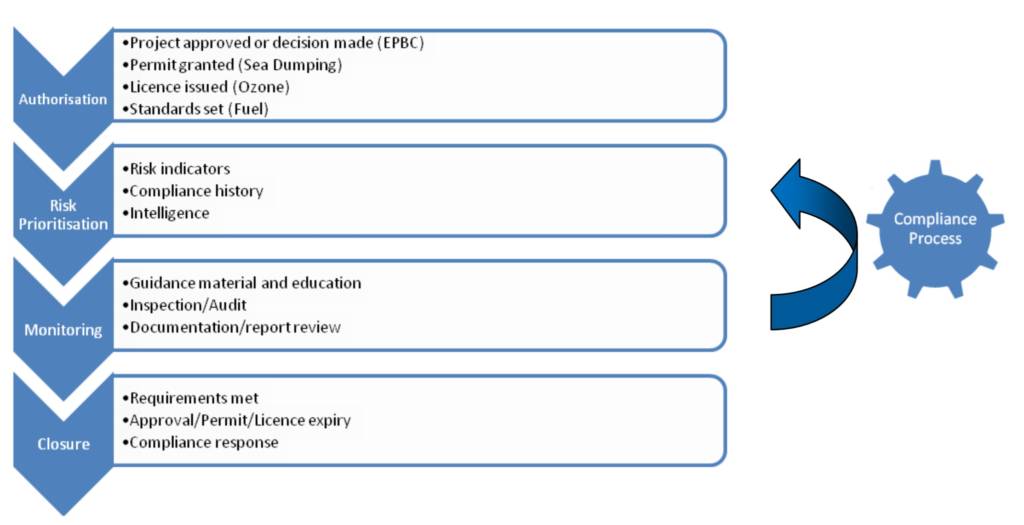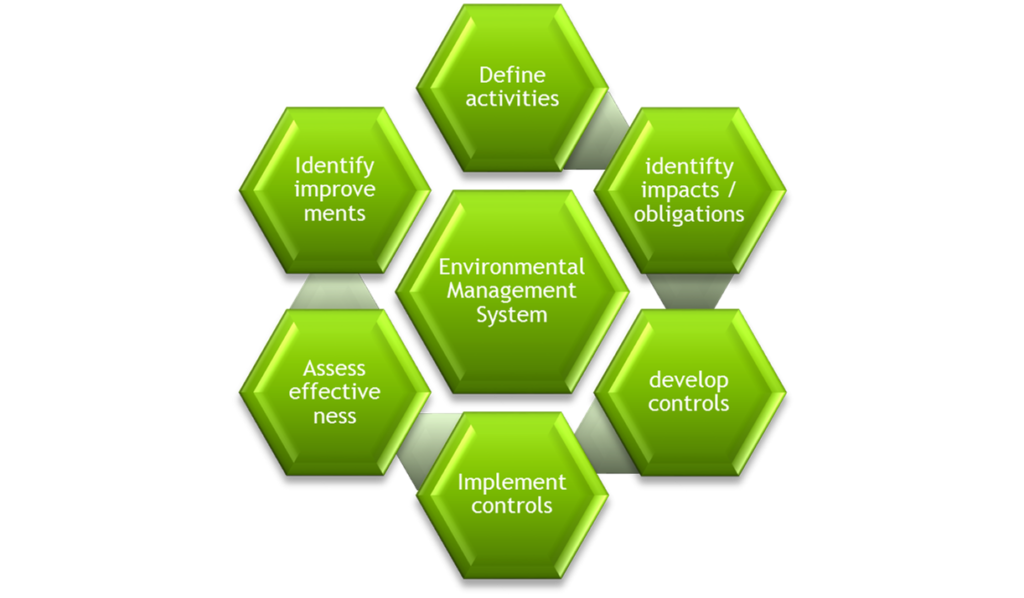January 9, 2017 in environment, compliance, management system, obligations, legislation
Protection of our environment is a key function of our government and industry. Since the introduction of environmental regulation in the 1960’s, there has been a range of legislative and compliance requirements introduced which business and industry need to comply with.
Most businesses are well aware of the importance of being compliant – particularly to protect their “social licence to operate” with both government and the community. As a result, non-compliance often comes from a lack of understanding about compliance or reporting requirements, rather than a lack of concern about the harm activities or operations may cause.
At a Commonwealth Level, the Department of the Environment and Energy (the department) is responsible for the protection of the environment, heritage and climate change – and is responsible for ensuring compliance with four key pieces of legislation that aim to protect the environment and reduce impacts on human health:
- The Environment Protection and Biodiversity Conservation Act 1999 (EPBC Act) – Australia’s national environmental law. Under the Act, any actions that are likely to have a significant impact on ‘matters of national environmental significance’ must be approved before they can begin.
- Environment Protection (Sea Dumping) Act 1981 – Regulates the dumping of waste at sea, incineration at sea and the placement of artificial reefs.
- Fuel Quality Standards Act 2000 – Regulation of the quality of fuel in Australia. Under the act, fuel supplied in Australia must:
- Reduce the level of pollutants and emissions arising from the use of fuel
- Facilitate the adoption of better engine and emission control technology
- Allow more effective operation of engines
- Ozone Protection and Synthetic Greenhouse Gas Management Act (1989) – Aims to control the use of, and phase out over time, substances that have the potential to deplete the ozone layer, or man-made gases that contribute towards climate change.
Compliance requirements under each of these pieces of legislation are most often detailed in the form of conditions attached to approvals, permits or licences. To keep track of how well these conditions are adhered the Department has a Compliance Monitoring Program. The main aim of the program is to identify any areas of non-compliance as early as possible and address any issues before they escalate.
The Department’s compliance process is based on (Figure 1):
- authorisation (granting of approval, issuing of permits or licences or setting of standards);
- prioritisation of the risks (by considering risk indicators, past compliance history and industry or market intelligence);
- monitoring (through guidance materials, education, inspections, audits and review of documentation and reports); and
- closure (ensuring requirements are met, the expiry of approvals, permits or licences and a compliance response).
Under this process, those areas that are identified as being the highest risk will have the greatest levels of compliance monitoring focus by the Department.

To help industry, each year the Department releases the key focus areas for its Compliance Monitoring Program. The key sectors and regions that will be the focus of the Department’s 2016-2017 Compliance Monitoring Program are:
- Coal, iron ore and mineral sands mining
- Oil and gas, including coal seam gas
- Residential development construction
- Road transport
- Central Queensland
- Northern New South Wales and the Hunter Valley
- The Perth and Peel regions in Western Australia
- The Pilbara region of Western Australia
To find out the specific objectives under each piece of legislation refer to the Department’s 2016-2017 Compliance Monitoring Program report.

The Compliance Monitoring program aims to promote and support responsible self-regulation by industries and businesses and the Department has clear expectations from the businesses and sectors it monitors.
So what does this mean for you – It is important that if you are a business owner or manager making decisions on behalf of a company that you have a clear understanding what your responsibilities are under the relevant legislation. You also need to have a good understanding of the conditions attached to any approvals, licences or permits and must make sure you know what you are allowed to do.

At Integrate Sustainability we understand that this can be difficult, particularly when you may have multiple approvals cross different levels of government and under differing pieces of legislation. One way to cover yourself and your business is to engage a third party to under take an independent review or audit of all of your compliance requirements. It is also benefical to have a central register of compliances, this may be simple a list of legislation and your approval or it may be a detailed list of specific obligations from legislation, approvals submission, licences, permits and agreements. The development and roll out of a company environmental management system or plan can also help businesses and there staff understand and manage their compliance requirements.
If you are planning to expand or change your business or operation at all, it is also important not to assume your current approval and licences will automatically cover any changes you’re planning. For example, approvals under the EPBC Act are not automatically transferred with the sale of a site or a project – an application needs to be made to the Minister to transfer the approvals to the new owners, and new or differing conditions may apply. If you are planning changes, and you do not employ inhouse Environmental Professionals it is recommended that you obtain specialist external advice to consider the compliance impacts and implications of those changes.
Compliance is more than just about reporting and risk management – both of benefit from having robust business management systems and processes in place. Rather than developing a range of different systems for your various compliance areas, a single system should exist that brings all processes and requirements together – this ensures no areas or deadlines are missed. The design and implementation of an effective management system can be challenging and may require assistance from an external experienced professional such as our staff at Integrate Sustainability. By engaging external resources you can ensure no obligation is over looked and compliance becomes a part of day to day operations rather than a reporting burden when deadlines are looming.
Another key area of compliance management is records keeping, and your system should ensure full records of all relevant activities are kept. As it is likely that at some point in time your business will be audited and / or have a site inspection by at least one regulator, you will need to ensure you have on hand all relevant records. If your systems and processes ensure your record keeping is comprehensive and up to date – these items shouldn’t be an issue, or require too much additional preparation if the audit or site inspection does come to pass. It’s also dangerous to assume that even if you don’t have a site inspection or audit, that your activities are not being monitored. Of note, many obligations don’t end when the approval or permit does or when a site is sold – the Department expects businesses to take all necessary steps to ensure they remain compliant, even after authorisations may have expired.
So if you have approvals and are located in the Department focus area for 2016/17 you should take care to ensure you are fully compliant with all approval and permit conditions and should consider obtaining expert advice on any areas they are concerned about.
The Department does consider past compliance history when assessing the risks attached to approvals and licences. Past non-compliance can often mean greater scrutiny for future approvals and permits. Keeping a strong compliance history – and having the reporting and systems to demonstrate this and will often help to reduce any risks perceived by the Department. At the very least, a compliance audit, or a review of your current systems and processes can indicate any areas that may need your attention before it’s too late.
If you need assistance understanding your compliance requirements further or would like an independent review of your internal systems please do not hesitate to contact Integrate Sustainability Pty Ltd via enquiries@integratesustainability.com.au or (+618) 9468 0338.
Belinda Bastow
Director / Sustainability Specialist
References:
- Dept of the Environment and Energy (2016) “Compliance Monitoring Program 2016-2017” (www.environment.gov.au/system/files/resources/75aae702-cebb-46e1-8ff9-bf0c4f216d82/files/compliance-monitoring-program-2016-17.pdf) (Access 05/01/2017)
